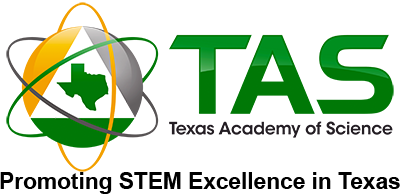|
ANNOUNCEMENT FOR 2025 ANNUAL STUDENT RESEARCH AWARD COMPETITION
The Texas Academy of Science announces the Annual Student Research Award Competition. Awards will be presented at the conclusion of the 129th annual meeting in Tyler hosted by the University of Texas at Tyler (February 27-28, 2026). The competition offers awards at three student category levels: PhD., M.S. and B.S./B.A. There are three awards in each category. The awards and amounts are as follows: first place – $2,000, second place – $1,500, and third place – $1,000. All students enrolled in a math, science, or science education curriculum in the State of Texas and out-of-state students in those states surrounding Texas, including Mexico, conducting research projects in Texas are also eligible for the awards.
A completed proposal should include the following cover sheet (downloadable in PDF format or Word format). In addition, we have provided some guidelines that may aid your grant writing. Here is the letter that is sent to each potential reviewer about how to judge the proposals. In addition, we also have the evaluation sheet that is used by reviewers when reviewing the proposal (click to view it). When writing, consider the criteria that the judges will be looking at as they review the research proposals.
CRITERIA FOR SUBMISSION OF THE TAS RESEARCH PROPOSAL
To be considered for an award, the student must:
- Be a member of the Texas Academy of Science prior to submitting the proposal: If NOT an Academy member, join on line via the Academy's web page (www.texasacademyofscience.org) well in advance of submitting the proposal. If the dues are being paid by the student’s institution, start the process early.
- Propose to conduct an INDEPENDENT STUDY: a research project in which the student is the principal project architect and will conduct the majority of the work. Proposed work may be laboratory and/or field research. Literature reviews are not eligible.
- Include in the proposal package a letter from the student’s advisor (not a letter of recommendation) testifying that the work is truly independent. The committee will not consider a submission in which a student has been assigned a portion of an existing research project in which he/she has no opportunity to design and carry out truly independent research.
- Submit an electronic PDF document written in the style appropriate to the discipline. A well-written proposal is defined as one that is relatively brief (up to 10 pages of text) and could be submitted to a funding agency in the student's field. Include a detailed budget and a Curriculum Vitae/resume. If multiple funding sources are being sought, the portion to be funded by TAS should be clearly identified. The entire proposal, including cover sheet and advisor’s letter, should be contained in one PDF document. The PDF title should follow this pattern: LastName-FirstName-PhD-proposal_year.pdf.
- Provide the date of graduation with the current degree. Proposals will not be considered if the student will graduate before the next TAS meeting.
- Agree to the following if an award is won: Give an oral presentation (preferred vs. poster) of your research results at the next Texas Academy of Science meeting, or submit in writing a request for a 1-year extension. If an oral presentation is not possible, submitting a manuscript to the Texas Journal of Science will satisfy this requirement (within the same 2-year time-frame). Failure to comply with presentation requirements will result in loss of future eligibility of the advisor’s students.
- Awardees will specify, on the cover sheet, to whom the award check should be made out: the awardee, the faculty member, the department or the institution. A reminder: checks to individuals are taxable by the IRS.
- The proposal must be received by the competition chair by 9 January 2026. Dr. Travis LaDuc is the Chair for the TAS Student Research Award Committee: [email protected].
REPORTING REQUIREMENTS OF AWARD WINNERS
In addition to presenting their research at the next annual meeting, winners are required to submit to the Academy, a brief, 1-page, progress report which is due on 15 September of the year in which the award is won. This report will summarize the progress to date, and list the amounts spent, and to whom the funds were paid, in an Excel-type format. Any questions and the brief report should be sent to [email protected]
|
